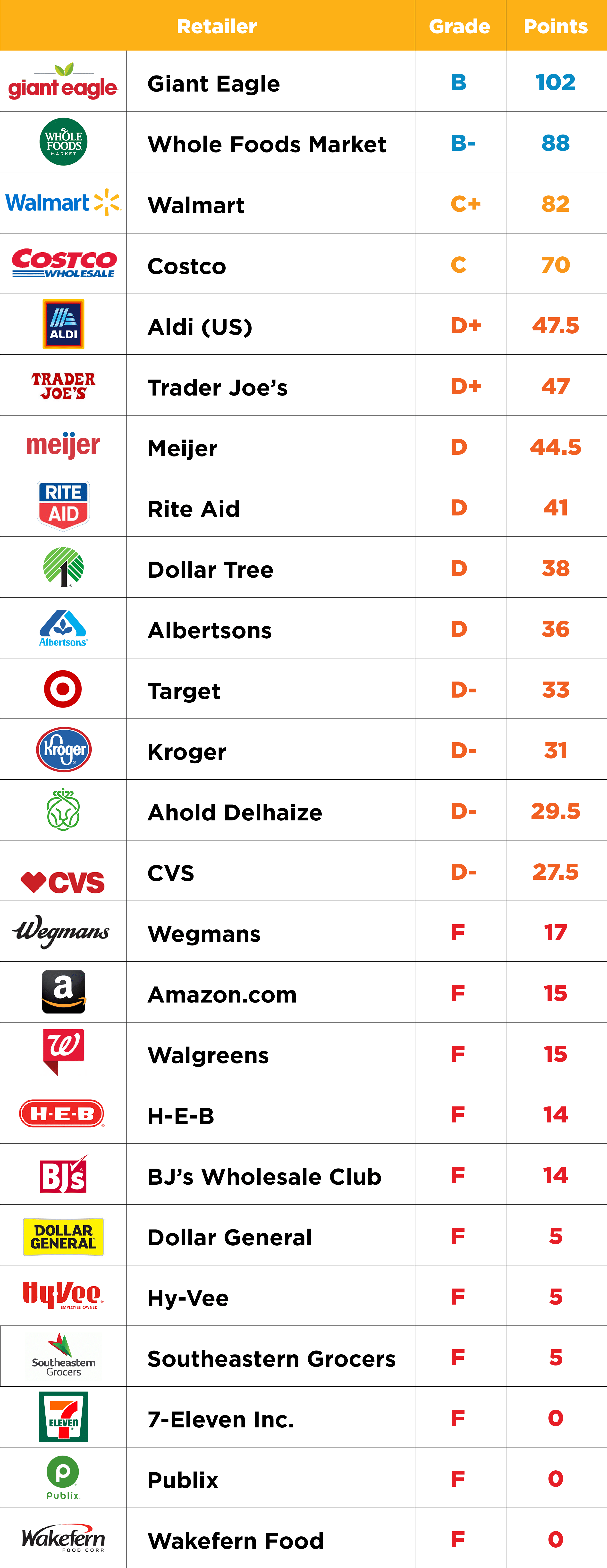New Scorecard Reports 10 Major U.S. Food Retailers’ Progress on Protecting Bees from Toxic Pesticides
Giant Eagle, Whole Foods and Walmart take top positions on Bee-Friendly Retailer ScorecardWASHINGTON DC – Friends of the Earth today released its latest Bee-Friendly Retailer Scorecard, ranking 25 of the largest US grocery retailers on pesticides and pollinator protection in their food and beverage supply chains. Ten retailers improved their scores since last year, with Giant Eagle, Whole Foods (NASDAQ: AMZN) and Walmart (NYSE: WMT) ranking as the top three.
Giant Eagle, in first place, is the only major U.S. food retailer to make a timebound commitment toward reducing pesticide use to protect pollinators. According to the company’s pollinator health policy, it will eliminate the use of nitroguanidine neonicotinoids — banned in the EU since 2018 but still allowed in the U.S. — from its produce supply chain by 2025.
This year, four additional companies, Walmart, Meijer, Target (NYSE: TGT) and Dollar Tree (NASDAQ: DLTR), established new pollinator health policies that encourage suppliers to eliminate or reduce the use of neonicotinoids, making ten in total since 2018. Research shows that U.S. agriculture has become 48 times more toxic to bees and other beneficial insects since neonicotinoids were introduced in the 1990s.
“Americans are more aware of how brittle the food systems that support us are than ever before. From climate change to biodiversity loss, threats are piling up that could one day lead to bare shelves at the grocery store,” said Kendra Klein, senior scientist at Friends of the Earth. “Science has clearly shown us that when pollinators disappear, food disappears, so we are counting on our food retailers to lead the way and protect the small but mighty pollinators that their supply chains depend on.”
Food retailers have significant economic power to change the food system. Together, the 25 evaluated companies controlled $1.65 trillion in food and beverage sales in 2020. The four largest — Walmart, Amazon, Kroger (NYSE: KR) and Costco (NASDAQ: COST) — controlled $924 billion.
74% of Americans believe grocery stores should support efforts to protect pollinators according to new polling from YouGov commissioned by Friends of the Earth. Additionally, 83% of customers believe it is important to eliminate pesticides that are harmful to pollinators from agriculture.
This year, Walmart and Giant Eagle also stepped up with timebound commitments to expand ecological farming practices known as Integrated Pest Management (IPM) in their produce supply chains with the goal of reducing overall use of toxic pesticides. Both companies will require all produce suppliers to become certified for IPM practices by 2025 through a vetted list of third-party certifications. Giant Eagle states that those suppliers not able to get certified will be required to create an IPM plan reviewed by a third party that meets key, stringent criteria.
Companies were also evaluated based on organic offerings. Research shows that organic farming can help reverse pollinator declines and can support up to 50% more pollinating species than conventional agriculture. Only two companies — Whole Foods and Trader Joe’s — have met Friends of the Earth’s ask to expand organic offerings to 15% of overall sales by 2025.
While agriculture accounts for the vast majority of pesticide use, the scorecard also awarded points to eleven companies for complimentary policies in their home and garden supply chains, including credit to Giant Eagle for removing all neonicotinoid and glyphosate products from store shelves and to Dollar Tree for committing to eliminate use of nitroguanidine neonicotinoids and glyphosate in its flower supply chain by 2024.
All of these retailer commitments follow a multi-year effort led by Friends of the Earth and allies that aims to address devastating losses in pollinator populations linked to agricultural pesticide use. The campaign is supported by over 100 beekeeping, farming, farmworker, consumer and environmental organizations, including Campaign for Healthier Solutions, which works with the dollar stores on phasing out harmful chemicals.
Expert contact: Kendra Klein, Ph.D, (415) 350-5957, [email protected]
Communications contact: Kerry Skiff, 202-222-0723, [email protected]

